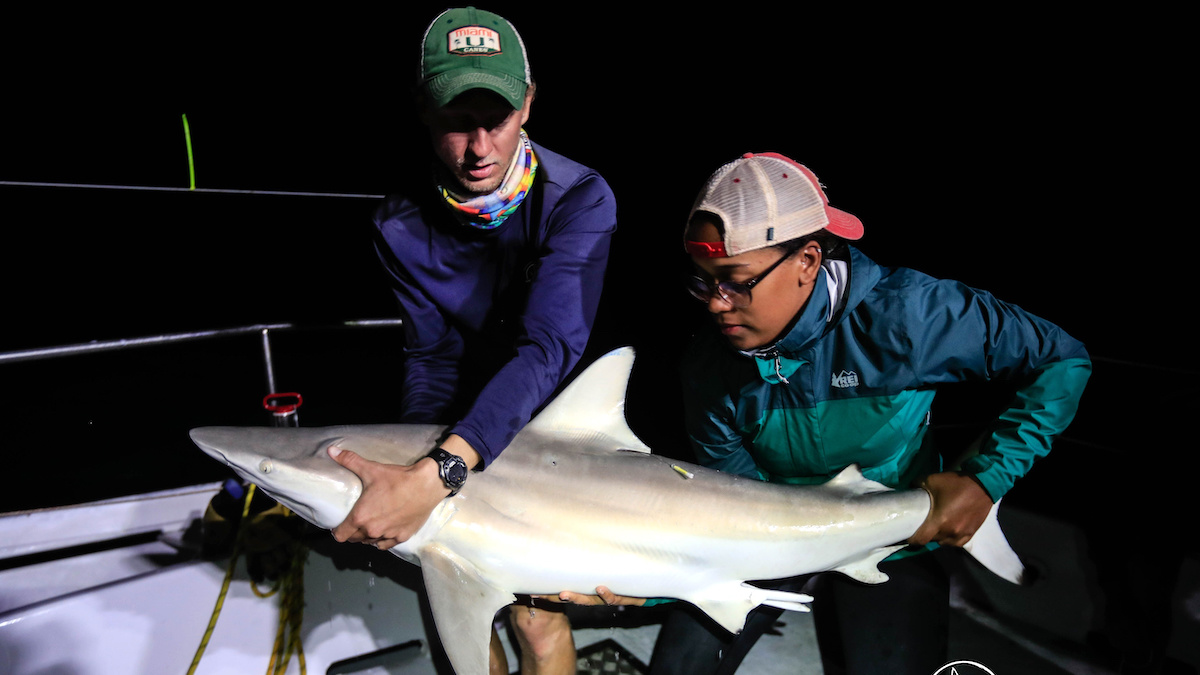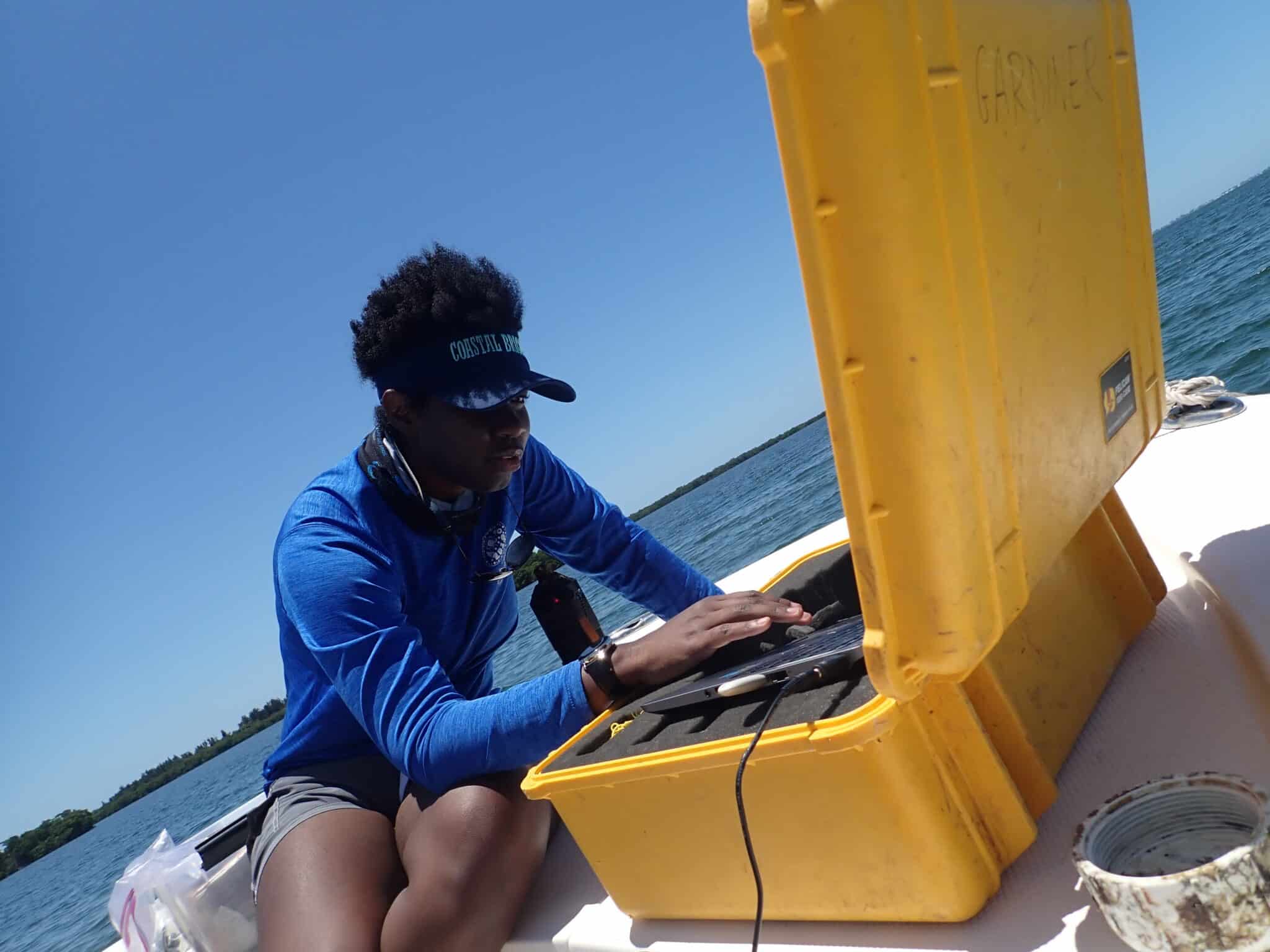
Black Women Shark Scientists Create Network to Encourage People of Color

Amani Webber-Schultz grabs an adult blacktip shark aboard a research vessel with the Field School. Field School
When Jasmin Graham describes her research on smalltooth sawfish, a critically endangered ray with a unique “saw” at the front of its face, she explains how “nothing else looks like this in the ocean; those species evolved to do something no other shark or ray can do.” It resonates, and people understand why diversity matters in sharks, she said. She expanded on this same concept to emphasize how diversity also matters in finding solutions to the challenges that threaten elasmobranchs and in those scientists doing that work.
Recent Black Lives Matter protests have reignited conversations about institutionalized racism and the importance of diversity and inclusion in all fields.
As a result, Graham, a young, black female shark scientist, found herself chatting on Twitter via the #BlackInNature hashtag with Amani Webber-Schultz, Carlee Jackson and Jaida Elcock, three other young, black female shark scientists from around the country.
They were excited to find each other and soon created a space for other women of color in shark science — MISS — to connect and not feel as alone.
“MISS means Minorities in Shark Science, and it really started because we didn’t see representation in the sciences, and that matters a lot when you’re young,” said Jackson.
In fact, a recent study found that black women scientists were not represented a single time in seven seminal textbooks used to teach U.S. science and medicine undergraduates, BBC reported.
“We need to start acting to address these disparities if we don’t want to exclude yet another generation of talented scientists,” said Rahma Elmahdi, an inclusion expert, reported BBC.
Graham told EcoWatch how she “didn’t know marine science was a thing” growing up. Her family fished and enjoyed the beach but never ventured below the water’s surface for fear of sharks and the inability to swim. When the scientists first showed interest in marine biology, her parents were supportive but could not provide her access to an actual marine scientist.
Graham had to figure it out on her own until a collegiate advisor went out of his way to mentor her in shark science and encourage graduate study.
“One of the reasons we started MISS is we recognized that we all are very lucky we had someone who stepped in and guided us,” she said, “but what happens to the people who don’t have someone step in? Do they just fail? That isn’t fair.”
MISS wants to become that “someone who steps in and helps,” Graham explained. Beyond that, the founders, who also serve as the executive board, envision the organization becoming a community of minority scientists who can rely on each other and provide the type of support that none of them experienced until they found each other a month ago.

Jasmin Graham downloads data from an acoustic receiver. Jasmin Graham
“We strive to be seen and take up space in a discipline which has been largely inaccessible for women like us,” the board stated. “We strive to be positive role models for the next generation.”
Each of the scientists emphasized the importance of innovation for science and of diversity for innovation.
“We believe diversity in the field creates more diversity in the knowledge and solutions,” said Jackson.
Life experiences and world views have a huge impact on how people think about and address global problems, Graham added. More perspectives leads to more creative ideas and solutions. Homogeneity in problem solvers leads to homogeneity in thought patterns and, often, to dead ends.
Fisheries science is grappling with this challenge, she said, often “running in circles” until they ask local indigenous communities to share their knowledge.
“If you don’t have everyone at the table, you don’t have all the information,” Graham said, “And science is all about data.”
Representation in policy decisions and research is paramount to creating the most inclusive, effective and long-lasting solutions, the board postured.
MISS is quickly gaining traction, already fundraising ,000 of their ,000 initial goal. The money will fund travel stipends and professional development workshops to 18 new minority women shark scientists next March and April.
Many people of color struggle with financial barriers to gain access and develop skills that would make them successful marine biologists, Elcock said, because most internships are unpaid or require payment for participation. The founders intend for the hands-on workshops, which will take place on the Field School research vessel where Webber-Schulz is a current fellow, to provide participants with critical field experience and to kick start their networks of minority shark scientists.
They also will focus on outreach to the younger generation, to be the role models they didn’t see for young, budding scientists of color.
“We want to make it clear that women of color belong in shark science, even if you don’t see them yet,” said Webber-Schulz. “We do exist and we are here to stay.”
Elcock summarized, “If we don’t have diversity, science loses. Everyone loses.”
- First-Ever Black Birders Week Tackles Racism Outdoors - EcoWatch
- 5 Women Environmental Leaders You Should Know - EcoWatch
- Women Are Rising in the Conservation Movement, but Still Face ...
- Black Environmentalists Are Organizing to Save the Planet From ...
- ‘Surprising’ Fossil Discovery Could Rewrite Shark Evolution Story - EcoWatch

 233k
233k  41k
41k  Subscribe
Subscribe 